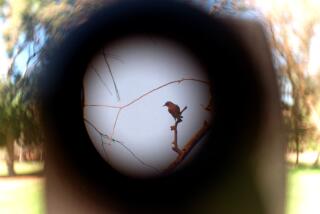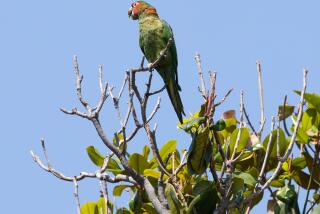Old Iraqi hobby takes off anew
- Share via
ZUBAYR, IRAQ — Nothing is too good for Thair abu Yousif’s loved ones. He buys ice each day to cool their water. He has built a special house for them, with a guard outside. Some nights he lies awake, wondering how to find them perfect mates.
That the objects of his adoration are pigeons does not strike Abu Yousif as odd. In fact, he is one of the most respected bird breeders in Iraq, his passion rekindled after years of violence that made lingering on rooftops an invitation to be shot by a sniper.
“This hobby is in my blood,” says Abu Yousif, who wears a traditional white dishdasha robe and black-and-white headdress, as he tends to his birds in his hometown of Zubayr, outside Basra in southern Iraq. He rarely travels, worried that he will not be there should any of his more than 100 birds fall ill. A well-tended bird can live 25 to 30 years, he says, and only he can provide the care they need; he even vaccinates them himself.
Abu Yousif, who has a real estate business on the side, has turned down immense sums of money to hang on to his best pigeons.
Recently, a wealthy breeder in a gulf country offered $4,000 for one of his favorites, a female roller pigeon, so called because of her ability to perform somersaults in the sky. “I didn’t sell it. I won’t, even if they pay me $10,000, because I love it,” Abu Yousif says.
Bird breeding has long been popular in Iraq, particularly in the south, where the marshes offer an ideal environment for many varieties. Pigeon breeding gained popularity after the British invasion in the early 1900s, which brought in people from India, Iran and other countries in which the hobby was popular. But it has been a difficult passion to pursue in recent years.
Under Saddam Hussein, the country’s closed borders made it a challenge for breeders to do business with those elsewhere. International sanctions and wars hurt the economy and hampered bird lovers’ efforts to support their hobbies and their families. A bird with a sterling pedigree costs as much as $1,000 straight from the egg.
In recent years, the spread of Shiite Muslim militia activity in southern cities such as Basra and Zubayr hindered hobbyists. Not only did breeders risk getting shot while on the roof with their birds, they were also accused by some religious extremists of using their high perches to stare into neighbors’ windows.
But militia activity has been largely quelled, and Abu Yousif and his friends feel safe once more.
Carrier and ornamental pigeons also are popular here. Carrier pigeons once transported messages during wartime. Now, they are bred for competitions: Breeders race them over long distances and bet on which will win. Ornamental pigeons are kept as pets.
Roller pigeons, Abu Yousif’s specialty, are the most popular and the most expensive to acquire and keep. They require special diets to stay strong and healthy but light enough to fly gracefully.
“Like a runner, he must keep himself thin,” says Abu Yousif, who gives adult birds a mixture of wheat, barley and corn. Young birds get more lentils and ground chickpeas in their food.
In the air, the rollers swoop and flip somersaults, their white, silver, blue and gray feathers catching the light. Luxuriant tails, made up of 12 to 18 feathers, add to the visual delight.
“I forget everything around me when I watch such birds,” says Murtada Mahal Mohammed, a pigeon breeder.
“When the birds fly, everyone’s eyes are on them,” Abu Yousif says. “According to our custom, nobody talks at all. Nobody answers their phone calls.”
That’s remarkable in a country where most people seem to have cellphones glued to their ears.
Priming such creatures is not easy. Roller pigeons can perform their aerobatics only when the wind is strong, about 25 mph to 30 mph. Their education begins when they are chicks, under gentle wind conditions of about 5 mph. Each year, the pigeons are subjected to stronger winds until they are deemed ready for breeding or selling.
During the winter, Iraq’s roller pigeon specialists gather in the south for a competition. Dozens of breeders have their birds fly for a few minutes before a group of judges. Just as Olympic judges rate gymnasts for style, form and the difficulty of their maneuvers, the pigeon panel rates the competitors. A bird that fails to complete a certain number of somersaults or gets blown off course by the wind loses points. One that can fly in a straight line back and forth, without gaining or losing altitude, scores highly.
Breeders use a combination of whistles and the banging of sticks against iron sheets to steer their charges. This can make the mentors unpopular with neighbors. Abu Yousif had to sell one talented bird for only $300 because neighbors complained about the ruckus when people gathered on his roof to watch it perform.
Once, bird breeders were looked down upon by other Iraqis, who eyed them with suspicion for their obsession with feathered creatures and their habit of staring skyward.
Nabeel Merhad Zerhan, a breeder, insists that testimony by bird lovers generally is discounted in court because Iraqis believe them incapable of noticing anything except their birds. But as more shops dedicated to birds open and as cross-border trade and prices increase, the bird lovers’ image is improving. So is their outlook.
“When the militias were controlling things, we were not working freely,” Abu Yousif says as he watches his pigeons fly. “Now, we enjoy freedom.”
More to Read
Sign up for Essential California
The most important California stories and recommendations in your inbox every morning.
You may occasionally receive promotional content from the Los Angeles Times.










